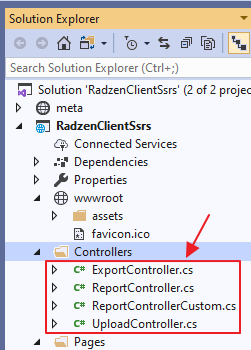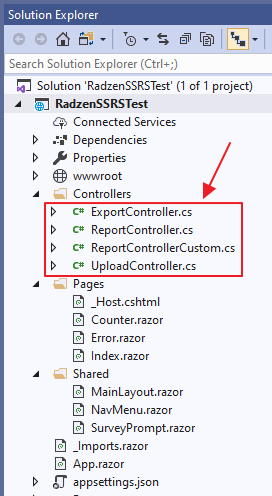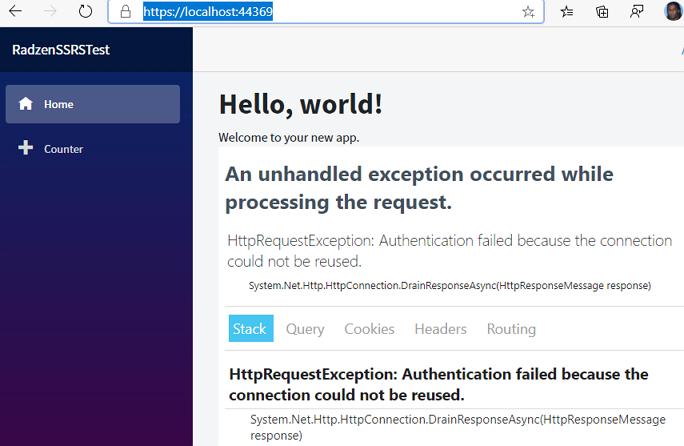(I do understand that this may not be a supported situation but I thought I would ask)
If I create a fully working application, that connects to a password protected .rdl report in a SSRS server, using the Radzen Blazor application builder it works!
If I take the following code from that project:
...and put it in my project (that has all the same .net version, project settings, startup.cs, and program.cs, and nuget packages):
and use this tag on a .razor page:
<RadzenSSRSViewer ReportName="reports/FYIS_Transcipt"
ReportServer="https://{{MY SERVER}}/ReportServer"
style="height: 400px"
UseProxy="true">
</RadzenSSRSViewer>
I get the following error:
System.Net.Http.HttpRequestException: Authentication failed because the connection could not be reused.
at System.Net.Http.HttpConnection.DrainResponseAsync(HttpResponseMessage response)
at System.Net.Http.AuthenticationHelper.SendWithNtAuthAsync(HttpRequestMessage request, Uri authUri, ICredentials credentials, Boolean isProxyAuth, HttpConnection connection, HttpConnectionPool connectionPool, CancellationToken cancellationToken)
at System.Net.Http.HttpConnectionPool.SendWithNtConnectionAuthAsync(HttpConnection connection, HttpRequestMessage request, Boolean doRequestAuth, CancellationToken cancellationToken)
at System.Net.Http.HttpConnectionPool.SendWithRetryAsync(HttpRequestMessage request, Boolean doRequestAuth, CancellationToken cancellationToken)
at System.Net.Http.AuthenticationHelper.SendWithAuthAsync(HttpRequestMessage request, Uri authUri, ICredentials credentials, Boolean preAuthenticate, Boolean isProxyAuth, Boolean doRequestAuth, HttpConnectionPool pool, CancellationToken cancellationToken)
at System.Net.Http.RedirectHandler.SendAsync(HttpRequestMessage request, CancellationToken cancellationToken)
at System.Net.Http.DecompressionHandler.SendAsync(HttpRequestMessage request, CancellationToken cancellationToken)
at System.Net.Http.DiagnosticsHandler.SendAsync(HttpRequestMessage request, CancellationToken cancellationToken)
at System.Net.Http.HttpClient.FinishSendAsyncBuffered(Task`1 sendTask, HttpRequestMessage request, CancellationTokenSource cts, Boolean disposeCts)
at RadzenClientSsrs.Controllers.ReportController.ForwardRequest(HttpClient httpClient, HttpRequest currentReqest, String url) in C:\Users\Michael\Documents\Visual Studio 2019\Projects\RadzenSSRSTest\Controllers\ReportController.cs:line 129
at RadzenClientSsrs.Controllers.ReportController.Get(String url) in C:\Users\Michael\Documents\Visual Studio 2019\Projects\RadzenSSRSTest\Controllers\ReportController.cs:line 25
at lambda_method(Closure , Object )
at Microsoft.Extensions.Internal.ObjectMethodExecutorAwaitable.Awaiter.GetResult()
at Microsoft.AspNetCore.Mvc.Infrastructure.ActionMethodExecutor.AwaitableResultExecutor.Execute(IActionResultTypeMapper mapper, ObjectMethodExecutor executor, Object controller, Object[] arguments)
at Microsoft.AspNetCore.Mvc.Infrastructure.ControllerActionInvoker.<InvokeActionMethodAsync>g__Awaited|12_0(ControllerActionInvoker invoker, ValueTask`1 actionResultValueTask)
at Microsoft.AspNetCore.Mvc.Infrastructure.ControllerActionInvoker.<InvokeNextActionFilterAsync>g__Awaited|10_0(ControllerActionInvoker invoker, Task lastTask, State next, Scope scope, Object state, Boolean isCompleted)
at Microsoft.AspNetCore.Mvc.Infrastructure.ControllerActionInvoker.Rethrow(ActionExecutedContextSealed context)
at Microsoft.AspNetCore.Mvc.Infrastructure.ControllerActionInvoker.Next(State& next, Scope& scope, Object& state, Boolean& isCompleted)
at Microsoft.AspNetCore.Mvc.Infrastructure.ControllerActionInvoker.<InvokeInnerFilterAsync>g__Awaited|13_0(ControllerActionInvoker invoker, Task lastTask, State next, Scope scope, Object state, Boolean isCompleted)
at Microsoft.AspNetCore.Mvc.Infrastructure.ResourceInvoker.<InvokeNextResourceFilter>g__Awaited|24_0(ResourceInvoker invoker, Task lastTask, State next, Scope scope, Object state, Boolean isCompleted)
at Microsoft.AspNetCore.Mvc.Infrastructure.ResourceInvoker.Rethrow(ResourceExecutedContextSealed context)
at Microsoft.AspNetCore.Mvc.Infrastructure.ResourceInvoker.Next(State& next, Scope& scope, Object& state, Boolean& isCompleted)
at Microsoft.AspNetCore.Mvc.Infrastructure.ResourceInvoker.<InvokeFilterPipelineAsync>g__Awaited|19_0(ResourceInvoker invoker, Task lastTask, State next, Scope scope, Object state, Boolean isCompleted)
at Microsoft.AspNetCore.Mvc.Infrastructure.ResourceInvoker.<InvokeAsync>g__Awaited|17_0(ResourceInvoker invoker, Task task, IDisposable scope)
at Microsoft.AspNetCore.Routing.EndpointMiddleware.<Invoke>g__AwaitRequestTask|6_0(Endpoint endpoint, Task requestTask, ILogger logger)
at Microsoft.AspNetCore.Diagnostics.DeveloperExceptionPageMiddleware.Invoke(HttpContext context)
I can provide my project if you want to look at it.
Again, I do understand if this is not a supported situation. However, I would be willing to Blog on this! ![]()
Thank You




